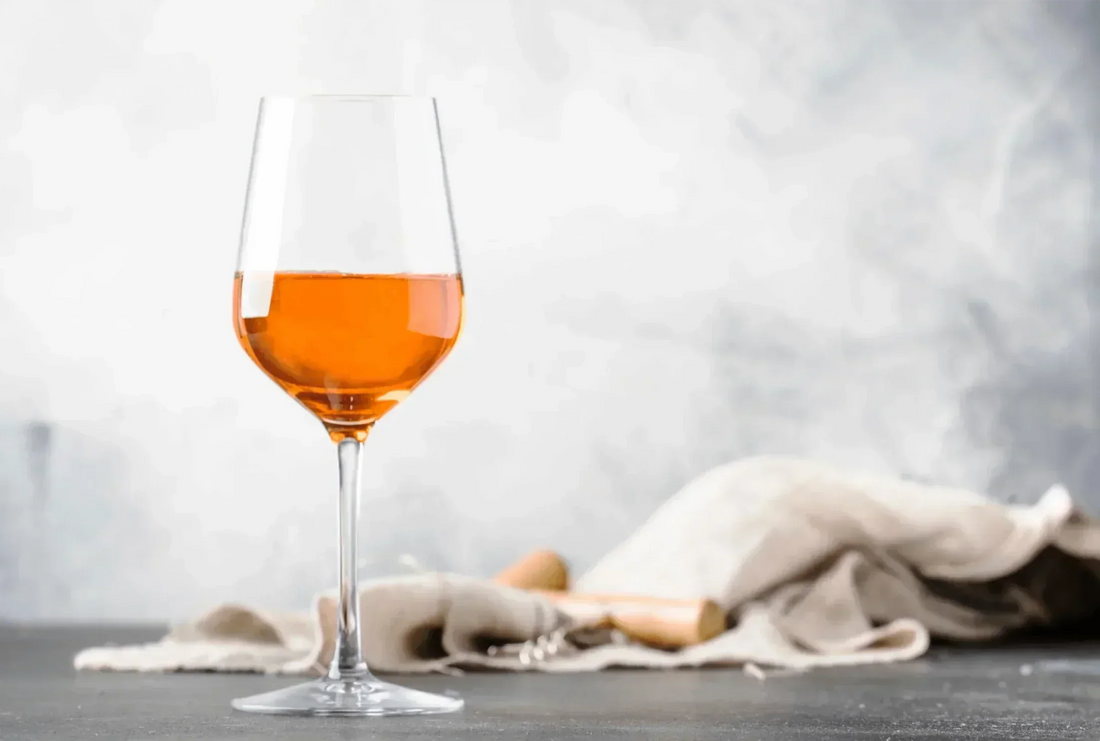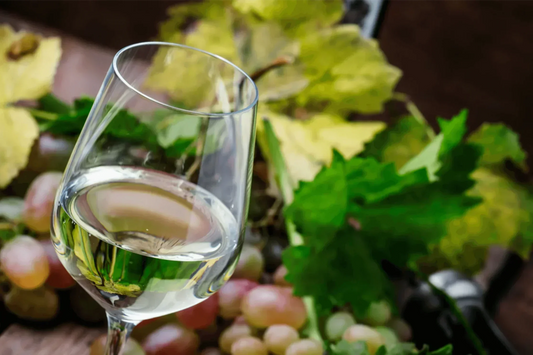
What Is Orange Wine? Taste, Food Pairing & Winemaking Explained
Orange wine has become one of the most exciting trends in the wine world, but what is orange wine, how is it made, and what does it taste like? Made by fermenting white grapes with their skins, this amber-hued style delivers bold, complex flavours that stand out from traditional white or red wines. In this guide, we’ll break down its origins, distinctive taste, and why it’s capturing so much attention today.
What is Orange Wine?
Orange wine is a type of white wine made by fermenting white grapes with their skins and seeds, a technique typically used for red wines. This process, called extended skin contact, can last from a few days to several months and gives orange wine its signature amber hue, structured tannins, and a bold, complex flavour that combines the freshness of white wine with the depth of red. Unlike rosé, which is made from red grapes with only brief skin contact, orange wine is produced from white grapes with extended fermentation, resulting in a distinctive and adventurous drinking experience.
Key Features of Orange Wine
- Made from white grapes with extended skin contact (days to months).
- Characterised by a deep amber or orange hue.
- Often has tannins more typical of red wines.
- Flavour notes include nutty, spicy, tea-like, or dried fruit qualities.
Red vs White vs Rosé vs Orange Wine: Key Differences
| Red vs White vs Rosé vs Orange Wine Comparison Chart | |||||
|---|---|---|---|---|---|
| Type of Wine | Grapes Used | Skin Contact | Typical Colour | Flavour Profile | Food Pairing Highlights |
| Red Wine | Red/black grapes | Long skin contact (weeks) | Deep red to purple | Bold, tannic, dark fruits, spice | Red meat, stews, hard cheeses |
| White Wine | White grapes | Minimal/no skin contact | Pale yellow to gold | Crisp, fresh, citrus, floral | Seafood, salads, light pasta |
| Rosé Wine | Red/black grapes | Short skin contact (hours) | Pink to salmon | Light, fruity, refreshing | Tapas, grilled chicken, soft cheese |
| Orange Wine | White grapes | Extended skin contact (days to months) | Amber to orange | Dry, textured, nutty, tea-like, savoury | Spiced dishes, aged cheese, fermented foods |
✨ Loved learning about orange wine, but curious about other easy-drinking options?
Discover our curated list of the 10 best canned wines of 2025 , perfect for picnics, parties, or just casual sipping at home.
How Orange Wine Is Made
Orange wine is made using an ancient yet distinctive winemaking method that differs from traditional white and red wines. Instead of quickly separating grape juice from the skins as in white wine production, winemakers keep the skins and sometimes even the seeds in contact with the juice for a longer period. This skin-contact fermentation not only produces the wine’s unique amber hue but also adds more tannins, richer textures, and complex flavours that range from nutty and honeyed to earthy and savoury.
Here’s a step-by-step look at how orange wine is typically made:
- Harvesting white grapes (commonly Rkatsiteli, Ribolla Gialla, or Pinot Grigio) at peak ripeness.
- Fermenting juice with skins and seeds for days, weeks, or even months, unlike white wines, where skins are removed immediately.
- Allowing natural oxidation during fermentation, especially in clay amphorae or open-top vessels, to deepen flavour complexity.
- Minimal intervention winemaking, often with little to no added yeast, enzymes, or sulfites.
- Ageing in amphorae, oak barrels, or stainless steel, depending on the desired style and tradition.
The result is a wine that bridges the freshness of white wine with the structure of red, creating a bold, versatile, and memorable drinking experience.
What Does Orange Wine Taste Like?
| Typical Orange Wine Taste Profile | |
|---|---|
| Characteristic | Orange Wine Taste Description |
| Sweetness | Usually dry, not sweet |
| Acidity | Crisp, sometimes tart |
| Tannins | Noticeable, like red wine |
| Body | Medium to full-bodied |
| Aromas | Nutty, fruity, herbal, earthy |
| Finish | Long, grippy, layered |
Orange wine has a bold and complex flavour that combines the crisp freshness of white wine with the tannic structure of red wine. Thanks to its skin-contact fermentation, the taste is often described as rich, earthy, and textured, making it very different from the citrus-forward profile of most white wines.
🔍 Key Flavour Notes of Orange Wine:
- Dried fruits: apricot, peach, orange peel
- Nuts & seeds: hazelnut, almond, brazil nut
- Oxidative notes: bruised apple, beeswax, sherry
- Herbal & savoury: black tea, linseed oil, juniper
- Fermented or sour tones: sourdough, kombucha, fruit beer
- Textural elements: firm tannic grip (similar to unsweetened iced tea), slightly astringent finish
👉 New to orange wine and not sure how to taste it the right way? Don’t worry, wine tasting is easier than you think. Check out our " step-by-step wine tasting guide " to learn the basics and start enjoying every sip with confidence.
How to Pair Orange Wine with Food
When it comes to food pairing, orange wine shines with bold, umami-rich, spicy, or fermented dishes. Its firm tannins, earthy flavours, and refreshing acidity make it ideal with foods that might overpower lighter wines but complement orange wine’s complexity beautifully.
👉 In short, the best foods to pair with orange wine are those with strong flavours and complex textures, while delicate dishes like steamed fish or light salads may be overwhelmed.
Best Food Pairings for Orange Wine
- Spicy dishes: Indian curries, Thai stir-fries, Sichuan hot pot
- Fermented foods: kimchi, miso vegetables, pickled radish
- Umami-rich vegetables: mushrooms, roasted eggplant, caramelised onions
- Hearty legumes: lentil stews, chickpea tagine, bean soup
- Charcuterie boards: cured meats, pâtés, aged cheeses
- Bold seafood: grilled octopus, smoked salmon, anchovies
- Cheese pairings: washed-rind cheeses, aged Gouda, pecorino
- Middle Eastern flavours: tahini, za’atar, labneh with olive oil
Not sure where to start?
Get a monthly pick of the best canned wines. Curated by us, sized for one or two glasses, and always easy to love.
Start My Wine JourneyCancel, skip or pause anytime. Free tracked UK delivery.
Pro Tip: What Not to Pair
Avoid pairing orange wine with delicate or subtle dishes such as poached white fish, steamed vegetables, or lightly seasoned salads. The wine’s tannins and bold flavours can easily overpower these foods.
🍴 Wondering what dishes pair best with your favourite wine?
Explore our " Wine Pairing 101 guide " for simple, foolproof rules that will instantly elevate your meals.
Most Famous Orange Wine Around the World
Orange wine may have ancient origins, but its influence is now widespread. From Europe’s historic vineyards to the New World’s innovative cellars, winemakers are adopting skin-contact techniques to produce bottles that showcase their local terroir, each with unique character, structure, and story. Here are some of the most renowned regions crafting outstanding orange wines.
Italy
At the heart of the orange wine revival, Friuli-Venezia Giulia leads with bold, structured wines. Many are matured in amphorae or large oak casks, showcasing native grapes like Ribolla Gialla and Pinot Grigio.
- Notable Producers: Radikon, Gravner, Cos, Donati Camillo, Angiolino Maule, Franco Terpin
Slovenia
Just across the border from Friuli, Slovenia’s Goriška Brda region produces rustic yet elegant orange wines, often with minimal intervention. They embody a deep connection to nature and centuries-old traditions.
- Notable Producers: Klinec, Movia, Prinčiz
Georgia
Widely considered the birthplace of orange wine, Georgia has been producing skin-contact wines for over 8,000 years using clay qvevri. Wines crafted from local grapes like Rkatsiteli provide earthy richness and a solid structure.
- Notable Producers: Pheasant’s Tears, Alaverdi Monastery, Our Wine, Tbilvino, Lagvinari
United States
In states like New York and California, winemakers are adopting orange wine within the natural wine movement. Their experimental methods with various white grapes produce vibrant, lively expressions.
- Notable Producers: Channing Daughters, Red Hook Winery, Pax Mahle, Scholium Project, Salinia
Australia
From Adelaide Hills to Victoria, Australian winemakers are bringing creativity in skin-contact wines. Usually fresh and juicy, they are often crafted with Sauvignon Blanc or Semillon.
- Notable Producers: BK Wines, Born & Raised Wines, Lucy Margaux Vineyards, Patrick Sullivan
France
Although Jura is better known for oxidative whites like Vin Jaune, winemakers across France are now producing orange wines that combine funkiness with refined elegance.
- Notable Producers: Vin Jaune, Côtes du Jura, Gérard Bertrand, La Sorga, Jean-Yves Peron, Domaine Gauby
Austria
In Styria (Steiermark), biodynamic methods and amphora ageing produce Austrian orange wines with rich texture, minerality, and lively natural vibrancy.
- Notable Producers: Strohmeier, Werlitsch, Maria & Sepp Muster
Conclusion
Orange wine exemplifies how ancient tradition blends with modern innovation. Characterised by its skin-contact winemaking process, it offers a flavour profile that is bold, textured, and full of character. This unconventional style challenges expectations and rewards curious drinkers with something genuinely distinctive. Whether you’re sipping a chilled can on the go or exploring bottles from regions like Georgia or Friuli, orange wine encourages you to broaden your palate and reimagine what white wine can be.
FAQ
1. What is orange wine?
Orange wine is a white wine made by fermenting white grapes with their skins (and sometimes seeds) for an extended time, giving an amber hue, gentle tannins and savoury complexity.
2. How is orange wine made?
Unlike typical white wine, the juice stays in contact with the skins for days to months (skin-contact fermentation), sometimes in amphora or oak, which adds colour, texture and depth.
3. What does orange wine taste like?
Usually dry, grippy and aromatic with notes of dried apricot/orange peel, nuts, herbal tea and a lightly astringent, tea-like finish.
4. What food pairs best with orange wine?
Bold, umami-rich or spiced/fermented dishes: curries, kimchi, mushrooms, aged cheeses, grilled octopus, Middle-Eastern flavours (tahini/za’atar). Delicate dishes can be overpowered.



